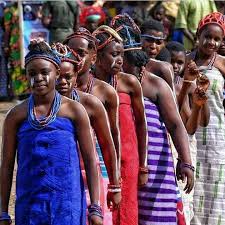In the valleys of Ogori-Magongo local government area of Kogi state, there is an annual cultural festival that has thrived and refused erasure despite modernity. This is the Ovia-Osese festival celebrated two weeks after Easter Sunday. The festival is an initiation rite for girls fifteen years and above into womanhood and adulthood. The male version of Ovia-Osese is the Ekon-Orire which is celebrated only by the Magongo people in recent times. In Magongo, the Ovia-Osese festival is called the Owiya-Osese festival and is celebrated four weeks after Easter Sunday.
The Ogori tribe is a minor ethnic group that primarily speaks Oko and is found in the north-central of Nigeria, Kogi state. They occupy the Ogori-Magongo local government, a local government that hosts the Ogori and Magongo people. The Ogori-Magongo is said to be the smallest local government in Kogi with a population of 65,000 people. They share borders with Imoga, Lampese, Bekuma, Olokoto, Makeke, Ojah, Ekpedo and Ososo of Edo State.
The Ovia-Osese is a festival that celebrates the virginity and sexual purity of Ogori maidens. Only maidens from 15 years and above, who have successfully kept their virginity and never engaged in immorality are eligible to be part of the Ovia-Osese. Through the week-long rites and celebrations, the maidens are initiated into womanhood while shedding and mourning their childhood. Many parts of the initiation rites have been scrapped to be in tandem with modernity yet the festival still survives. This is because the Ogori have utilised the festival as an annual gathering to discuss the socio-economic development of their state and most importantly, the sustenance of their identity and language.
Before the Ovia-Osese became a well-celebrated festival in the State, it was celebrated only by families whose teenage daughters were virgins. In recent times, the festival has always been organised by the Ogori Descendants Union(ODU). The eligible maidens called the Ivia are camped and taught by an Iyodina who is an elderly woman in the Ogori land. At the camp, she teaches them societal and cultural values and most importantly the morals of womanhood. Notably, there is no genital mutilation in the training for womanhood.
On completion of the training at the camp, the Ivia are taken to the public square on the last day of the festival. They are adorned with beads and Aso-Oke while they perform the Oke dance accompanied by mournful chants that signify their sadness on leaving their childhood to become women. Men who seek wives also look for their missing ribs on this day. The festival encompasses initiation rites, dancing, cooking and talent competitions, quizzes, language and sports competitions.
The Ovia-Osese plays a huge role in the moral values of the Ogori people as sexual purity is highly valued in their land. More so, it is an avenue for the preservation of their cultures and language.
Photo Credits:
Igala Sons & Daughters-Facebook
The Ogori Culture: Origin, language and festival | Pulse Nigeria
References:
Ufahamu: A Journal of African Studies
https://guardian.ng/news/ogoris-ovia-osese-festival-promotes-sanctity-of-virginity/

